#media history digital library
Text

#Lantern#Media History Digital Library#Orson Wells#Citizen Kane#1941#Noir#Cinematography#Gregg Toland
2 notes
·
View notes
Text
The Media History Digital Library Is a Great Place to Research the History of Film, Radio & Television Broadcasting & Recorded Sound
The Media History Digital Library Is a Great Place to Research the History of Film, Radio & Television Broadcasting & Recorded Sound
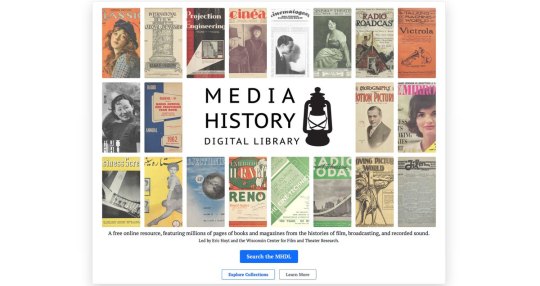
View On WordPress
#Bob Gottschalk#film industry#History#media history#Media History Digital Library#MHDL#movie industry#NLA#radio broadcasting#Robert E. Gottschalk#Robert Edward Gottschalk#Robert Eric Gottschalk#Robert Gottschalk#Robert Krasker#television broadcasting#television industry#trade journals#trade media#trade newspapers#trade press#trade publications#Trove
0 notes
Text
You're a reasonably informed person on the internet. You've experienced things like no longer being able to get files off an old storage device, media you've downloaded suddenly going poof, sites and forums with troves full of people's thoughts and ideas vanishing forever. You've heard of cybercrime. You've read articles about lost media. You have at least a basic understanding that digital data is vulnerable, is what I'm saying.
I'm guessing that you're also aware that history is, you know... important? And that it's an ongoing study, requiring ... data about how people live? And that it's not just about stanning celebrities that happen to be dead?
Congratulations, you are significantly better-informed than the British government!
So they're currently like "Oh hai can we destroy all these historical documents pls? To save money? Because we'll digitise them first so it's fine! That'll be easy, cheap and reliable -- right? These wills from the 1850s will totally be fine for another 170 years as a PNG or whatever, yeah? We didn't need to do an impact assesment about this because it's clearly win-win! We'd keep the physical wills of Famous People™ though because Famous People™ actually matter, unlike you plebs. We don't think there are any equalities implications about this, either! Also the only examples of Famous People™ we can think of are all white and rich, only one is a woman and she got famous because of the guy she married. Kisses!"
Yes, this is the same Government that's like "Oh no removing a statue of slave trader is erasing history :("
You have, however, until 23 February 2024 to politely inquire of them what the fuck they are smoking. And they will have to publish a summary of the responses they receive. And it will look kind of bad if the feedback is well-argued, informative and overwhelmingly negative and they go ahead and do it anyway. I currently edit documents including responses to consultations like (but significantly less insane) than this one. Responses do actually matter.
I would particularly encourage British people/people based in the UK to do this, but as far as I can see it doesn't say you have to be either. If you are, say, a historian or an archivist, or someone who specialises in digital data do say so and draw on your expertise in your answers.
This isn't a question of filling out a form. You have to manually compose an email answering the 12 questions in the consultation paper at the link above. I'll put my own answers under the fold.
Note -- I never know if I'm being too rude in these sorts of things. You probably shouldn't be ruder than I have been.
Please do not copy and paste any of this: that would defeat the purpose. This isn't a petition, they need to see a range of individual responses. But it may give you a jumping-off point.
Question 1: Should the current law providing for the inspection of wills be preserved?
Yes. Our ability to understand our shared past is a fundamental aspect of our heritage. It is not possible for any authority to know in advance what future insights they are supporting or impeding by their treatment of material evidence. Safeguarding the historical record for future generations should be considered an extremely important duty.
Question 2: Are there any reforms you would suggest to the current law enabling wills to be inspected?
No.
Question 3: Are there any reasons why the High Court should store original paper will documents on a permanent basis, as opposed to just retaining a digitised copy of that material?
Yes. I am amazed that the recent cyber attack on the British Library, which has effectively paralysed it completely, not been sufficient to answer this question for you. I also refer you to the fate of the Domesday Project. Digital storage is useful and can help more people access information; however, it is also inherently fragile. Malice, accident, or eventual inevitable obsolescence not merely might occur, but absolutely should be expected. It is ludicrously naive and reflects a truly unpardonable ignorance to assume that information preserved only in digital form is somehow inviolable and safe, or that a physical document once digitised, never need be digitised again..At absolute minimum, it should be understood as certain that at least some of any digital-only archive will eventually be permanently lost. It is not remotely implausible that all of it would be. Preserving the physical documents provides a crucial failsafe. It also allows any errors in reproduction -- also inevitable-- to be, eventually, seen and corrected. Note that maintaining, upgrading and replacing digital infrastructure is not free, easy or reliable. Over the long term, risks to the data concerned can only accumulate.
"Unlike the methods for preserving analog documents that have been honed over millennia, there is no deep precedence to look to regarding the management of digital records. As such, the processing, long-term storage, and distribution potential of archival digital data are highly unresolved issues. [..] the more digital data is migrated, translated, and re-compressed into new formats, the more room there is for information to be lost, be it at the microbit-level of preservation. Any failure to contend with the instability of digital storage mediums, hardware obsolescence, and software obsolescence thus meets a terminal end—the definitive loss of information. The common belief that digital data is safe so long as it is backed up according to the 3-2-1 rule (3 copies on 2 different formats with 1 copy saved off site) belies the fact that it is fundamentally unclear how long digital information can or will remain intact. What is certain is that its unique vulnerabilities do become more pertinent with age." -- James Boyda, On Loss in the 21st Century: Digital Decay and the Archive, Introduction.
Question 4: Do you agree that after a certain time original paper documents (from 1858 onwards) may be destroyed (other than for famous individuals)? Are there any alternatives, involving the public or private sector, you can suggest to their being destroyed?
Absolutely not. And I would have hoped we were past the "great man" theory of history. Firstly, you do not know which figures will still be considered "famous" in the future and which currently obscure individuals may deserve and eventually receive greater attention. I note that of the three figures you mention here as notable enough to have their wills preserved, all are white, the majority are male (the one woman having achieved fame through marriage) and all were wealthy at the time of their death. Any such approach will certainly cull evidence of the lives of women, people of colour and the poor from the historical record, and send a clear message about whose lives you consider worth remembering.
Secondly, the famous and successsful are only a small part of our history. Understanding the realities that shaped our past and continue to mould our present requires evidence of the lives of so-called "ordinary people"!
Did you even speak to any historians before coming up with this idea?
Entrusting the documents to the private sector would be similarly disastrous. What happens when a private company goes bust or decides that preserving this material is no longer profitable? What reasonable person, confronted with our crumbling privatised water infrastructure, would willingly consign any part of our heritage to a similar fate?
Question 5: Do you agree that there is equivalence between paper and digital copies of wills so that the ECA 2000 can be used?
No. And it raises serious questions about the skill and knowledge base within HMCTS and the government that the very basic concepts of data loss and the digital dark age appear to be unknown to you. I also refer you to the Domesday Project.
Question 6: Are there any other matters directly related to the retention of digital or paper wills that are not covered by the proposed exercise of the powers in the ECA 2000 that you consider are necessary?
Destroying the physical documents will always be an unforgivable dereliction of legal and moral duty.
Question 7: If the Government pursues preserving permanently only a digital copy of a will document, should it seek to reform the primary legislation by introducing a Bill or do so under the ECA 2000?
Destroying the physical documents will always be an unforgivable dereliction of legal and moral duty.
Question 8: If the Government moves to digital only copies of original will documents, what do you think the retention period for the original paper wills should be? Please give reasons and state what you believe the minimum retention period should be and whether you consider the Government’s suggestion of 25 years to be reasonable.
There is no good version of this plan. The physical documents should be preserved.
Question 9: Do you agree with the principle that wills of famous people should be preserved in the original paper form for historic interest?
This question betrays deep ignorance of what "historic interest" actually is. The study of history is not simply glorified celebrity gossip. If anything, the physical wills of currently famous people could be considered more expendable as it is likely that their contents are so widely diffused as to be relatively "safe", whereas the wills of so-called "ordinary people" will, especially in aggregate, provide insights that have not yet been explored.
Question 10: Do you have any initial suggestions on the criteria which should be adopted for identifying famous/historic figures whose original paper will document should be preserved permanently?
Abandon this entire lamentable plan. As previously discussed, you do not and cannot know who will be considered "famous" in the future, and fame is a profoundly flawed criterion of historical significance.
Question 11: Do you agree that the Probate Registries should only permanently retain wills and codicils from the documents submitted in support of a probate application? Please explain, if setting out the case for retention of any other documents.
No, all the documents should be preserved indefinitely.
Question 12: Do you agree that we have correctly identified the range and extent of the equalities impacts under each of these proposals set out in this consultation? Please give reasons and supply evidence of further equalities impacts as appropriate.
No. You appear to have neglected equalities impacts entirely. As discussed, in your drive to prioritise "famous people", your plan will certainly prioritise the white, wealthy and mostly the male, as your "Charles Dickens, Charles Darwin and Princess Diana" examples amply indicate. This plan will create a two-tier system where evidence of the lives of the privileged is carefully preserved while information regarding people of colour, women, the working class and other disadvantaged groups is disproportionately abandoned to digital decay and eventual loss. Current and future historians from, or specialising in the history of minority groups will be especially impoverished by this.
16K notes
·
View notes
Text
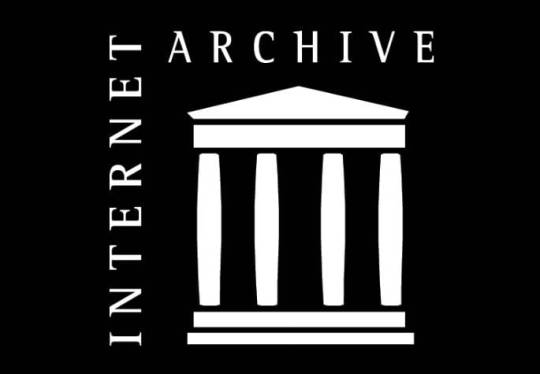
A copyright lawsuit filed by several major publishers puts the future of the Internet Archive's scan-and-lend library at risk. In a recent appeal, the non-profit organization argued that its solution is protected fair use and critical to preserving digital books. This position is shared by copyright scholars, the Authors Alliance, and other supporters now backing IA in court.
The Internet Archive (IA) is a non-profit organization that aims to preserve digital history for generations to come. The digital library is a staunch supporter of a free and open Internet and began meticulously archiving the web over a quarter century ago.
In addition to archiving the web, IA also operates a library that offers a broad collection of digital media, including books. Staying true to the centuries-old library concept, IA patrons can also borrow books that are scanned and digitized in-house.
Publishers vs. Internet Archive
The self-scanning service is different from the licensing deals other libraries enter into. Not all publishers are happy with IA’s approach which triggered a massive legal battle two years ago.
Publishers Hachette, HarperCollins, John Wiley, and Penguin Random House filed a lawsuit, equating IA’s controlled digital lending (CDL) operation to copyright infringement. Earlier this year a New York Federal court concluded that the library is indeed liable for copyright infringement.
The Court’s decision effectively put an end to IA’s self-scanning library, at least for books from the publishers in suit. However, IA is not letting this go without a fight and last week the non-profit filed its opening brief at the Second Circuit Court of Appeals, hoping to reverse the judgment.
Support from Authors Alliance
IA doesn’t stand alone in this legal battle. As the week progressed, several parties submitted amicus curiae briefs to the court supporting IA’s library. This includes the Authors Alliance.
The Authors Alliance represents thousands of members, including two Nobel Laureates, a Poet Laureate of the United States, and three MacArthur Fellows. All benefit from making their work available to a broad public.
If IA’s lending operation is outlawed, the authors fear that their books would become less accessible, allowing the major publishers to increase their power and control. The Alliance argues that the federal court failed to take the position of authors into account, focusing heavily on the publishers instead. However, the interests of these groups are not always aligned.
“Many authors strongly oppose the actions of the publishers in bringing this suit because they support libraries and their ability to innovate. Authors rely on libraries to reach readers and many are proud to have their works preserved and made available through libraries in service of the public.
“Because these publishers have such concentrated market power […], authors that want to reach wide audiences rarely have the negotiating power to retain sufficient control from publishers to independently authorize public access like that at issue here,” the Alliance adds.
This critique from the authors is not new. Hundreds of writers came out in support of IA’s digital book library at an earlier stage of this lawsuit, urging the publishers to drop their case. [...]
Copyright Scholars Back IA
In a separate amicus brief, several prominent legal and copyright scholars, many of whom hold professor titles, raise similar arguments. They believe that IA’s lending system is not that different from the physical libraries that are an integral part of culture.
“Libraries have always been free under copyright law to lend materials they own as they see fit. This is a feature of copyright law, not a bug,” the brief reads.
What is new here, is that publishers now assert full control over how their digital books are treated. Instead of allowing libraries to own copies, they have to license them, which makes it impossible to add them to the permanent archive.
“The major publishers refuse to sell digital books to libraries, forcing them to settle for restrictive licenses of digital content rather than genuine ownership. Moreover, publishers insist they can prevent libraries from scanning their lawfully purchased physical books and lending the resulting digital copies.” [...]
149 notes
·
View notes
Note
Hey! I'm a big fan of your historical work (especially your sewing!) and thumbed through your pinterest awhile ago (thank you for linking it at some point) and was wondering if you have any reference books for period fashion that you like! Not any period in specifics, just any literature or media that you've found helpful, or return to often! Thank yeww
Hello ! I've listed a few books that were useful to me to understand construction on historical clothing in this post, but I've used those books more in my little historical costuming hobbies than for design.
When it come to character design historical references, my main sources are portraiture and contemporary illustration and I find most of it on archives or museum's online ressources. The only physical book of that type I sometimes use is Racinet's Costume History. I have a few books for napoleonic uniforms that sometimes come in handy including a few from the Men-at-Arms series of Osprey.
I think my main hubs for design references are probably the online collection of the V&A and Gallica BNF (the online ressource of the french national library).
For medieval stuff, I like to look at digitized versions of heavily illuminated manuscript like Les Très Riches Heures du Duc de Berry in the collection of the castle of Chantilly ( loads of colourful XVth century fashion) or the lovely Manesse Codex on the website of the Heidelberg University Library (14th century, some of these are the cutest stuff you've ever seen).
These days, for my revolutionary calendar project, I'm using a lot of illustrations from the Gallica digitizations of several "Cris de Paris " street studies, esp the ones by Vernet and Poisson, for reference of commonfolk clothing from the late 18th century and early 19th.
For 16th-17th century stuff, it's even earsier ; paintings from the early modern era depict garments very realistically both in upperclass portraiture and in scenes that represent lower class people like tavern scenes and the like. For these I honestly just rely on wikisource for high res files of classic european masters stuff.
To be fair I usually hang out on Pinterest, try to find stuff that looks credible and matches the vibe of whichever project I'm working on and work backwards looking for the sources if I don't know them already. A lot of old fashion plate books and manuscript can be found fully digitized online, no need for an expensive library and acres of shelf space ! Hope this helps !
549 notes
·
View notes
Text
USEFUL ANARCHIST AND LEFTIST SITES ON THE WEB
1: The Anarchist Faq: this attempts to answer any questions one might have about anarchism. (the anarchist library, which this faq is on, is also an absolutley excellent rescource and maybe the biggest collection of anarchist theory on the web)
2: the tv tropes page for anarchism (yes, im serious). this manages to be a suprisingly well done and easy to read explanation of what anarchism is, what its about, and the different types of anarchists idealogies.
3: Anarchopedia. like wikipedia, but specifically for anarchism
more resources below the cut! and feel free to add more in reblogs.
4: the iww. the iww isnt anarchist, but im putting it here as its a member-led, grassroots union for all workers of the world.
iww.org
5: Zoe Baker has a PHD in anarchist history and is one of the few well researched and well read left politcs channels on youtube
youtube.com/@anarchopac
6: Organize magazine is a good source of anarchist news in the UK
organisemagazine.org.uk
7: Freedom News is another great source of anarchist news in the UK
freedomnews.org.uk
8: Mutual Aid Hub (afaik this is US only)
mutualaidhub.org
9:Black Rose Federation (also US only)
blackrosefed.org
10: symbiosis revolution (US only)
symbiosis-revolution.org
11: Marxists Internet Archive. while this site isnt really anarchist, it is leftist and has some anarchist texts. i also think marxism is worth learning about even as an anarchist whos views do not align with Marx.
Marxists.org
12: Neighborhood Anarchists. Neighborhood Anarchists is a direct action anarchist group based in Springfield and Eugene Oregon.
neighborhoodanarchists.org
13: Anarchist News. This is a site that provides news that is relevant to or about anarchism
Anarchistnews.org
14: A-Infos. This is a multi-lingual news service by, for, and about anarchists.
https://www.ainfos.ca/en/
15: CrimeThInk. This is an international network of aspiring revolutionaries all over the world.
crimethinc.com
16: It's Going Down. This is a digital community center for anarchist, anti-fascist, autonomous anti-capitalist and anti-colonial movements across so-called North America.
itsgoingdown.org
17: Libcom. This is is a resource for everyone fighting to improve their lives, communities and working conditions.
libcom.org
18: Unicorn Riot. This is a decentralized, educational non-profit media organization.
unicornriot.ninja
19: Submedia. Submedia is an anarchist digital media collective that produces videos and podcasts
sub.media
20: Zine Library. This is a compilation of anarchist zines and booklets, imposed for easy printing, as well as a few posters. (zines can be downloaded by pressing code > download zip)
github.com/rechelon/zine_library
181 notes
·
View notes
Text
In just a few weeks, Nintendo 3DS and Wii U owners will finally completely lose the ability to purchase new digital games on those aging platforms. The move will cut off consumer access to hundreds of titles that can't legally be accessed any other way.
But while that's a significant annoyance for consumers holding onto their old hardware, current rules mean it could cause much more of a crisis for the historians and archivists trying to preserve access to those game libraries for future generations.
"While it's unfortunate that people won't be able to purchase digital 3DS or Wii U games anymore, we understand the business reality that went into this decision," the Video Game History Foundation (VGHF) tweeted when the eShop shutdowns were announced a year ago. "What we don't understand is what path Nintendo expects its fans to take, should they wish to play these games in the future."
Libraries and organizations like the VGHF say their game preservation efforts are currently being hampered by the Digital Millennium Copyright Act (DMCA), which generally prevents people from making copies of any DRM-protected digital work.
The US Copyright Office has issued exemptions to those rules to allow libraries and research institutions to make digital copies for archival purposes. Those organizations can even distribute archived digital copies of items like ebooks, DVDs, and even generic computer software to researchers through online access systems.
But those remote-access exemptions explicitly leave out video games. That means researchers who want to access archived game collections have to travel to the physical location where that archive resides—even if the archived games themselves were never distributed on physical media.
475 notes
·
View notes
Note
How did you come to draw and paint the way you do? What inspirations do you pull from? All of your art oozes with some strange, almost ethereal emotion I've not quite seen anywhere else, something similar to what I'd like to capture with my own works.
I’ve always had a bit of a hard time answering this bc like…I honestly think aesthetic/inspirational/taste stuff is a library you build up over your whole life, or maybe a closet that you try things on to see what does and doesn’t work for you. My biggest advice to this kinda stuff is to experiment a lot and take in a lot of media in a purposeful way, and try to actively apply things you like about said medias to your work. And don’t just consume stuff within your field, I take inspiration from a ton of stuff that isn’t art. I also recommend having somewhere to keep a kind of reserve of inspo, wether it be on tumblr or Pinterest or what have you.
So with that being said I’ll try to sum up what I can about myself.
I’m a horror lover, have been since I was (too) young. I’ve consumed a ton of horror movies, read a lot of books, and certainly have digested a lot of art about it. I am a bit of a haunted person haha, and I’ve always really attached myself to horror, and with some exception to just purely cute stuff I truly am always thinking about it with my work. I am not really aiming to make people feel comfortable with my stuff, in fact often the opposite, but many feel understood anyways which feels nice. I don’t think horror for horrors sake is always as fufilling to me, it always pulls from something internal that I’ve been wrestling with or are afraid of myself.
I am classically trained in fine art due to the kind of art program my highschool had (magnet program if that means anything to anyone), it was incredibly good and I always feel so lucky I got to go there. Bc of this I learned a lot of techniques in painting as well as the fundamental of art. I don’t think my art would be the way it is without this training, but I also think with how the internet is now you can probably do the same thing at your own pace, just have to be dedicating a decent amount of time and mental energy into it.
Bc of my highschool training I also learned about art history, which had a big impact on me, particularly renaissance, baroque, and rococo. Religious imagery as well had a huge impact on me, particularly catholic (probs cause we learned about it it the most). I would say doing master studies with these would be a huge help.
I would say it’s important to me that each “full” illustration tells a story of sorts, I can’t really help it, I’m a story teller at heart. I use a lot of symbolic imagery, I pull a lot from religious imagery but also within fruit, flowers, personal objects… I think “what am I trying to say with this work” and kind of go from there with what I choose. Make your own personal symbolism language.
There’s like this certainty digital painting aesthetic I really enjoy by niche furry artist lol, many of them really nsfw so I don’t feel comfortable linking to them. It’s like…highly detailed well rendered pieces that they make with literally one brush that is often without any kind of pen pressure, just layering things with opacity. It’s crazy and yeah idk they’re definitely up there in inspo for me.
I really really care about fashion. Lolita was my first love in terms of clothing, and I pull a ton of inspiration from it, but also a lot of other street styles and runways stuff. I like drama and frills.
I play with my art and stories in a way that I don’t know how to describe other than childlike. It’s important for me to do so in my process, but basically, I let my imagination run wild, I talk to my characters, I listen to music and think about them. A lot of my bigger pieces take a lot of time of me thinking about them ahead a time, I draw in my head a lot. Sketchbooks are a huge help in this.
I thiiiiiink that’s all I have to say for now…I could probably list a million things but this feels like a good core to start with. I hope it’s not too vague, but I’m always good to keep answering stuff like this if you wanna know about one part in depth.
32 notes
·
View notes
Text
♀️latscho diwes djuviale♀️
💞 I made this blog to highlight the specific struggles Romani women face based on our sex, our race and our class
💞 I'm anti-gender, anti-sex trade, anti-religion, anti-capitalist
💞 I support women's and LGB rights. My feminism is female only!
💞 I'm a half-sinti, half-white working class homosexual woman living in Western Europe
BEFORE YOU BLOCK ME, READ THIS: x
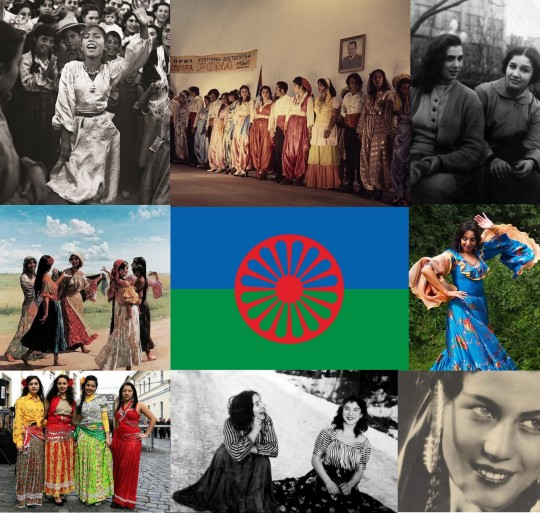
FAQ, BOOKS AND RESOURCES BELOW
General / Frequently asked questions
-> Difference between Roma and Romanian (x)
-> Difference between Roma and Sinti (x)
-> My profile picture is from De la source à la mer (1984), by Sinti-Manouche filmmaker and writer Pisla Helmstetter
-> My banner is from The Gypsies are Found Near Heaven (1975), by Emil Loteanu
Posts on the racialized misogyny targeting Romani women
-> general masterpost (x)
-> posts on Romani women being sex trafficked into prostitution in Europe (x) (x)
-> posts on the forced sterilization of Romani women in Europe (x) (x) (x) (x)
-> post on healthcare discrimination (x)
-> incest, sexual and domestic violence targeting Eastern European Romani women (x) (x)
-> Roma, religion and misogyny (x)
-> On "Gypsy witches" (x)
Inspiring Romani women you should know about
-> autobiographies by Romani women (x)
-> Sandra Jayat, French-Romani painter and poet (x)
-> Katarina Taikon, Swedish-Romani writer and antiracist activist (x) (x)
-> Elena Gorolova, Czech-Romani women's rights advocate (x)
-> Jelena Savić, Serbian-Romani feminist, poet and essayist (x)
-> Tela-Tchaï, French-Romani actress (x)
-> Amoun Sleem, Palestinian-Domari antiracist activist and feminist (x)
-> Philomena Franz, German-Romani Holocaust survivor and writer (x)
-> Vera Kurtić, Serbian-Romani lesbian feminist (x)
-> Kiba Lumberg, Finnish-Romani and butch lesbian artist (x)
-> Zilli Schmidt, German-Romani Holocaust survivor (x)
-> "15 Bad ass Romani ladies you should know about" (x)
-> Romani herstory, an "ever-growing digital library that celebrates women of Romani descent from the past and present, unsung heroines & trailblazers who refuse(d) to conform to stereotypes"
Romani feminist writings
-> Intersections of Gender, Ethnicity, and Class: History and Future of the Romani Women’s Movement, by Jelena Jovanović, Angéla Kóczé, and Lídia Balogh (x)
-> Gender, Ethnicity and Class: Romani Women's Political Activism and Social Struggles, Angéla Kóczé (x)
-> Lessons from Roma Feminism in Europe: Digital Storytelling Projects with Roma Women Activists from Romania, Spain and Sweden, Jasmine Ljungberg (x)
-> Romani women’s identities real and imagined: Media discourse analysis of “I’m a European Roma Woman” campaign, Jelena Jovanović (x)
-> Džuvljarke: Roma Lesbian Existence, Vera Kurtić (x)
-> Re-envisioning Social Justice from the Ground Up: Including the Experiences of Romani Women, Alexandra Oprea (x)
-> Angéla Kóczé on the hijacking of the Romani feminist and antiracist movement by neoliberal groups (x) (x)
-> Mihaela Drăgan on the racialization of Romani women (x)
-> quotes from Romani feminist books (x)
Learn about the Romani genocide
-> general post (x)
The Genocide and Persecution of Roma and Sinti. Bibliography and Historiographical Review (x)
Roma Resistance During the Holocaust and in its Aftermath, Angéla Kóczé, Anna Lujza Szász (eds.) (x)
O Porrajmos: the Romani Holocaust, Ian Hancock (x)
Porrajmos: The Romani and the Holocaust, Ian Hancock (x)
Responses to the Porrajmos (the Romani Holocaust), Ian Hancock (x)
Barvalipe Roma Online University (playlist of lectures about many different aspects of Romani history, politics and culture) (x)
Romani slavery in Romania
Brief overview (x)
Alternatives to the labrys flag

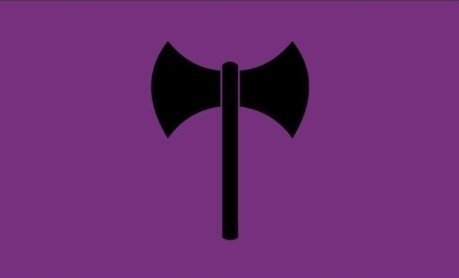
(first design by @/sapphos-darling)
362 notes
·
View notes
Note
Wait, bestiaries are real? I've only seen them in videogames. Can you find scans of them online? Or maybe ask libraries for books worh pictures/scans? Or is it something you need a degree to be able to access?
Not only are they real, they were a pretty popular genre during the Middle Ages. TTRPGs and video games get the word from that tradition. If you want to check them out but don't have university access, here are some suggestions:
The Aberdeen Bestiary is a particularly well-regarded example, and the University of Aberdeen has scanned the whole thing and made it publicly available under Creative Commons, with a transcription of the Latin and a translation into modern English. Which is an extremely cool thing for them to do. You can find it here:
If you prefer your media physical, the Bodley Bestiary is from the same manuscript tradition as the Aberdeen Bestiary and is thus very similar. There's a complete translation with full-color illustrations published in a very nice slipcover edition by the Folio Society -- if you search for, like, "folio society bestiary", there are copies available for around $30.
If that's a bit steep, there's a translation of a Latin bestiary which I believe is of the same tradition (I'm honestly not sure what manuscript it's working from; I don't have a copy of this one) by T. H. White called The Book of Beasts. You may know T. H. White from his fiction writing, most famously The Once and Future King. (And if that doesn't sound familiar to you, it's the retelling of the Arthurian legend that Disney's Sword in the Stone is based on.) You can get it for under $10 if you look for used copies.
If you'd prefer an overview rather than a deep dive into a specific bestiary, a fellow named David Badke has been maintaining and improving a seriously impressive database of bestiary entries for over twenty years now. Every beast listed in his index has a general description, then tabs along the top of that entry that quote different bestiary sources directly, provide a bibliography, point you to (frequently digitized) manuscripts in which the beast appears, and show a gallery of illustrations of said beast. You can find all that here:
If you're only familiar with bestiaries as they exist in games, I should warn you that while games usually pair the description of the beast with, like, how to fight it, medieval bestiaries usually pair the description with... spiritually edifying metaphors to help you understand what you can learn from this beast. Which isn't as much fun, unless you're a monk I guess.
Obviously everyone participating in the Bestiaryposting activity we're doing every week on this blog should be cautious accessing those resources or risk spoilers, especially since the Aberdeen Bestiary is the source I'm using for it.
50 notes
·
View notes
Text
I think there is something really tragic about those posts that are like "man can you imagine future archaeologists reading our posts" because I don't actually believe even a fraction of all the things we say will survive for very long.
We supposedly live in an information age where everything is recorded, and people say that once something is on the internet, it is there for ever, but this is clearly not true.
Most of the internet is managed by corporations, and when a certain website dies, there is absolutely no incentive to spend all the money necessary to preserve ecerything that was ever posted. Maybe Archive.org will have saved a lot, but it can't save everything.
Even right now internet history going back as recently as the 90s is really spotty. A lot of forums and sites are simply lost to time.
And maybe one day Archive.org will run out of money too, and everything they preserved will be lost, not in a dramatic bang like the fire in the Library of Alexandria, but with a whimper, like the many thousands of times more documents that have been lost simply because no one copied them in the few decades they had before the mold or worms or whatever else got to them.
Think of Sappho and Catullus, two of the most celebrated poets of ancient Greece and Rome respectively. Both were prolific, and both were titans, widely celebrated for their extraordinary work, long after their deaths.
Both had a single century or two where people got tired of them, and almost every single thing they ever wrote was irrecoverably lost, because books do not last forever, especially not the ones written on papyrus, which was the dominant medium at the time and has a quoted life span of about 70 years unless stored in nearly perfect conditions (desert conditions, which is why we associate papyrus with Egypt).
All we have now are a handfull of fragments of their work. They are, once again, and perhaps forever, celebrated as geniuses, but we can't ever undo that single, brief moment where the majority of their work was lost forever, not out of malice, but out of indifference.
Everything not actively, painstakingly, expensively maintained will be lost, inevitably and irretrievably. Stone carvings last longer, but they're horribly space inefficient. The invention of parchment, which can survive centuries, greatly improved things, but that too is extremely expensive compared to paper or papyrus. Modern digital storage is the same; we just made the copying process easier.
One day, tumblr will die. It is as inevitable as your death or mine. Or the death of the sun. In fact, tumblr will probably die within our lifetimes. When it dies, some things will be saved, but many will not. Some will miss it, but most will forget. Out of millions of posts, perhaps a few hundred thousand survive as jpeg screenshots on reddit, instagram, or whatever sites survive tumblr. Then, as those die, perhaps ten thousand screenshots of screenshots carry on to new social media sites, as of yet not made. And then a thousand of those survive as those sites die.
And maybe those will be the thousand best, and maybe some expert will even be able to tell you that they're screenshots of tumblr, and in a few words what tumblr was, but what even is the thousand best? Every copying act is a choice by someone who thought it was worth copying. Tastes change, and as they do, maybe one generarion's favorite is destroyed by the neglect of the next.
Tumblr isn't special. This is the future of all social media. Echos will persist, but so much will be lost.
So maybe, one day, an internet archaeologist will find your silly tumblr post about how crazy it would be if someone was reading what you said centuries from now. Unfortunately, there will be so much context missing. Maybe your post will be one of a mere hundred remaining, most of which make references to in-jokes and memes long forgotten: incomprehensible and empty. Like the statue in Ozymandias: nothing beside remains.
I'll end this with a poem from the lost poets I mentioned, and since this is tumblr, why not a gay one? Both Catullus and Sappho have their share of love poems dedicated to members of the same sex, but the partial poem known as Sappho 31 is probably the most well known. This is Edward Storer's translation:
He seems like a god to me the man who is near you,
Listening to your sweet voice and exquisite laughter
That makes my heart so wildly beat in my breast.
If I but see you for a moment, then all my words
Leave me, my tongue is broken and a sudden fire
Creeps through my blood. No longer can I see.
My ears are full of noise. In all my body I
Shudder and sweat. I am pale as the sun-scorched
Grass. In my fury I seem like a dead woman,
But I would dare...
... and that's it. The ending has never been found. Scholars think anywhere between a few lines and half the poem is missing.
#sorry for the bummer post lol. just had thoughts#mini essay#takes#history#poetry#archaeology#sappho#catullus#ancient greece#ancient rome#ancient history
37 notes
·
View notes
Text
A history of zines, from political activism to creative expression
by Kaitlyn Church

Zines evade strict definitions. They are journals with stapled and glued ephemera. They are digital collages. They are small poetry anthologies and folded pieces of paper full of doodles.
Pronounced as in “magazines,” zines are roughly described as self-published DIY booklets that feature — often underrepresented — personal, social or political expressions.
“It was, in its origins, about radical communication and dissemination of information,” zine artist and UNC alumnus SamLevi Middleton-Sizemore said. “So civil rights movements, the feminist movement, the early gay liberation movement, all used zines.”
Because of their loose definition, zines can look as experimental, professional or messy as an artist likes. Their messages, like their media, come in a variety of shapes and sizes, from music reviews to quirky satires and political calls to action.
They also provide a means for creating networks between underrepresented groups, according to Josh Hockensmith, the interim head of the Sloane Art Library at UNC, which has its own collection of contemporary zines.
READ MORE
52 notes
·
View notes
Note
Do you ever worry that media being so widely scattered and ubiquitous with no central source means good media will eventually just be lost to obscurity? I worry about that. Or do we just have to take it upon ourselves to share our favorite media in person/offline as much as possible in hopes people will take us up on the suggestion?
It more makes me think about how for most of human history it’s been like that. I wonder how many things we’ve lost! How many incredible wonderful things. I do worry about everything being on digital libraries though where big companies can pull it at any moment. We need a library of Congress that archives everything regardless of significant cultural and artistic value
24 notes
·
View notes
Text
Free Black History, Palestine, Socialism (and other) books on Haymarket
So, HaymarketBooks is a cool online bookstore that, while it does sell physical and digital books, it also offers a lot of free ebooks on subjects it thinks the public should be aware of.
Two categories I know of are Black History, after some racist law in the US that banned Black History resources
And Palestine, what with government media giving a super biased view of unfortunately
It’s in moments like these that we must turn to independent media and resource providers to educate ourselves on topics the government or other people don’t want us to learn about.
Now, here are all of Haymarket’s books they are offering for free, since their website doesn’t have a filter or sort by price option.
Here they are, 17 in total, as per 2nd Feb 2024 :)
Boycott, Divestment, Sanctions by Omar Barghouti, 320 pages
1989, The Number by Kevin Coval and Nate Marshall, 23 pages
Inauguration by Idris Goodwin and Nico Wilkinson, 23 pages
The Anti-Inauguration by Anand Gopal, Owen Jones, et al., 40 pages
Commando by E'mon Lauren,
Human Highlight by Kevin Coval and Idris Goodwin
1919 by Eve L. Ewing
The New Authoritarians by David Renton
Socialist Strategy and Electoral Politics
The Brother You Choose by Susie Day
Can't Pay, Won't Pay by Debt Collective
Black Lives Matter at School by Jesse Hagopian and Denisha Jones
Palestine: A Socialist Introduction Edited by Sumaya Awad and Brian Bean
Light in Gaza Edited by Jehad Abusalim, Jennifer Bing, et al., 280 pages
A Life of Activism by Howard Zinn, 81 pages
Our History Has Always Been Contraband Edited by Colin Kaepernick, Robin D. G. Kelley, et al.
From the River to the Sea Edited by Sai Englert, Michal Schatz, et al.
While their website is limited when it comes to pricing options, it's not limited with free books, so you don't need to enter a single financial detail to download these books :)
Note: I haven't read any of these books yet so the tags are just based on their book descriptions
Other places for more free books:
Liberation Library
On the colonization and ethnic cleansing of Palestine
Sudan guide, not an ebook, but #keep eyes on sudan #free sudan
Happy reading! :)
#haymarket books#free books#palestine#palestine resources#black history#debt collective#debt#socialism#activism#howard zinn#racism#authoritarianism#revolution#Chicago Race Riot#1919#basketball#poetry#chicago#resistance#1989#bds movement#black lives matter#book banning#history#modern history#gaza#west bank#social justice#sudan#educate yourself
26 notes
·
View notes
Text
Words, Quotes, and Life's Vibes: A Simple Dive into Online Wisdom
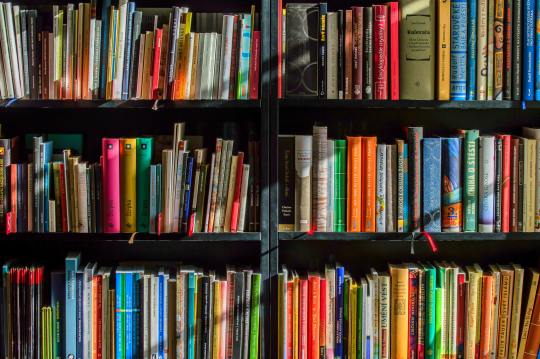
In the vast world of social media, some hashtags bring people together to share thoughts, feelings, and cool stuff. Let's explore hashtags like #Words, #Quotes, #Books, and more in a simple way.
Books and Libraries: #Books and #Libraries
These hashtags take us on adventures through old libraries and new novels. Book lovers and casual readers use them to talk about their favorite reads and the joy of getting lost in a good book.
Love and Beauty: #Love and #Beauty
These aren't just words; they're about feelings and the beautiful things around us. People online use these hashtags to share quotes about love, celebrate the beauty in the world, and talk about the connection between love and beauty.

Academic Vibes: #DarkAcademia, #LightAcademia, and #ChaosAcademia
These hashtags are like digital hangouts for folks who love learning and cool ideas. Each has its own style, inspired by books, art, and history. They create a visual feast and bring together a community of people who enjoy exploring knowledge and creativity.
Motivation and Positivity: #Motivation and #Positive
In a sometimes crazy world, these hashtags bring hope. People share quotes and stories to motivate each other and spread positive vibes. It's a supportive space encouraging resilience and optimism.
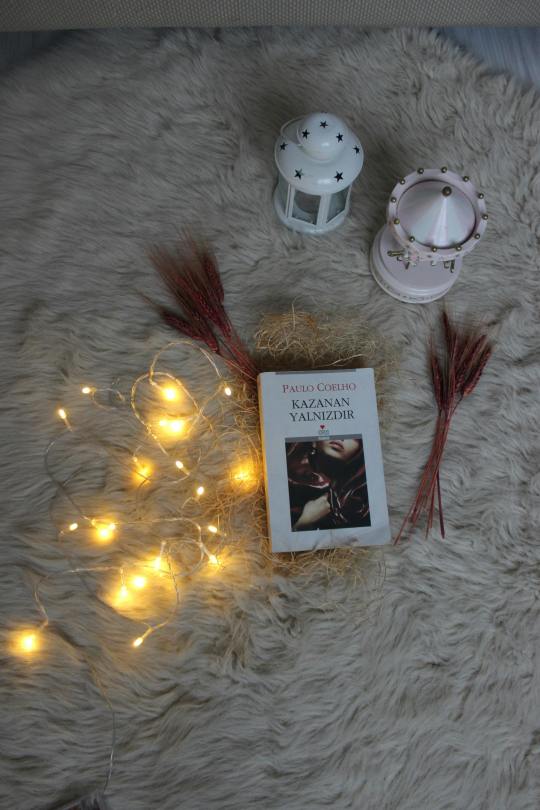
Challenges in Life: #MentalHealth and #Feminism
These hashtags talk about important stuff like mental health and gender equality. People share their experiences, helpful resources, and empowering quotes. It's about breaking stigmas, raising awareness, and supporting each other.

Vintage Vibes: #Vintage
This hashtag is all about the charm of the past. From classic books to retro styles, people use #Vintage to share things that bring back good old memories.
In conclusion, these hashtags are like a friendly chat online. They're not just trends; they're about shared experiences, creating a digital community where words become bridges connecting people on their life journeys.
#words#quotes#books#book quotes#love#beauty#dark academia#light academia#aesthetic#chaos academia#books and libraries#motivation#inspiration#vintage#relationship#feminism#mental health#positive
25 notes
·
View notes